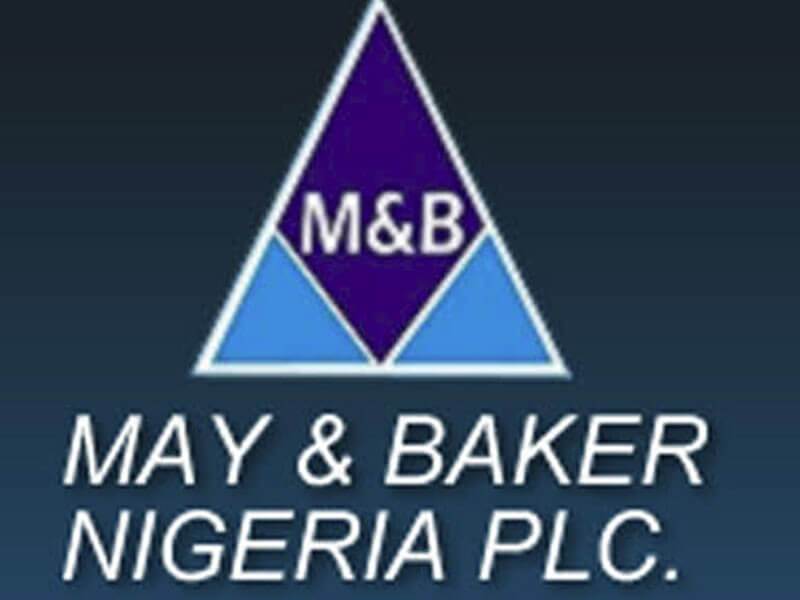- May & Baker Nigeria to Raise N2.45b New Equity Ca
Regulatory document obtained yesterday by The Nation indicated that May & Baker Nigeria Plc plans to float a rights issue of 980 million ordinary shares of 50 kobo each at N2.50 per share.
The rights issue has been provisionally pre-allotted on the basis of one new ordinary share for every one ordinary shares held as at the close of business on Tuesday, September 4, 2018.
Authorities at the Nigerian Stock Exchange (NSE) confirmed the receipt of the application from the healthcare company.
The confirmation came on the heels of recent report by The Nation that Nigeria’s largest cement and healthcare manufacturing companies, including May & Baker Nigeria, plan to raise N240 billion new capital to support growing business and restructure their balance sheets.
Shareholders had in 2014 empowered the company to raise up to N3.2 billion new equity capital.
Chairman, May & Baker Nigeria Plc, Lt. Gen Theophilus Danjuma (rtd), recently told shareholders that directors of the company believed that the time is now right to raise the funds to enable the company harness new opportunities.
“Therefore our rights issue will soon open and I hope shareholders will take up their rights to support our company in achieving its new vision. We shall all reap the rewards in the immediate future and beyond,” Danjuma said.
He outlined that the company has envisioned a new vision that will see it dominating the Sub-Saharan Africa (SSA) markets in line with its new vision of being the leading healthcare brand in SSA.
According to him, the new five-year strategic plan of the company entails focus and expansion along the company’s competitive advantage of healthcare and it will soon begin to establish footprints and seek dominance in this area in the SSA region.
“Your company has turned the corner and is now solidly on the path of growth and strong profitability. Our plan in the next few years is to focus on driving our new vision, strategic goals and establishing our footprint as a leading healthcare brand in Sub-Saharan Africa. The company will strive to acquire required competencies in related business areas, expand its regional reach to explore new markets, improve capacity utilization at our WHO GMP pharmaceutical facility in Ota and continue to deliver value and returns on investments to our loyal shareholders,” Danjuma said.
Key extracts of the interim report and accounts of May & Baker Nigeria for the six-month period ended June 30, 2018 showed that total comprehensive income-which included profit after tax and extra ordinary income rose to N601.37 million in first half 2018 as against N94.86 million recorded in the comparable period of 2017.
The 534 per cent increase in net distributable earnings has raised strong prospect of possible significant increase in dividend payout to shareholders. The healthcare company had increased its dividend payout by 233 per cent for the 2017 business year after it rounded off the year with significant growths in profitability.
The report showed a well-rounded improvement in the bottom-line of the healthcare company as key underlying profitability margins improved considerably during the period. Pre-tax profit margin-which measures average pre-tax profit per unit of sale and serves as benchmark for profitability of the company, tripled from 3.13 per cent in first half 2017 to 8.44 per cent in first half 2018. Gross profit margin had increased from 30 per cent in first half 2017 to 33 per cent in first half 2018 while operating margin also grew to 12.7 per cent in 2018 as against 10.11 per cent recorded in corresponding period of 2017.
Market analysts said the increase in gross margin, operating margin and pre-tax profit margin showed that the company’s performance in the first half was driven by improved business operations, increased efficiency and better cost management.
The report showed that group’s profit before tax rose by 178.76 per cent to N388.90 million in first half 2018 as against N139.51 million recorded in comparable period of 2017. Profit after tax also leapt by 178.78 per cent from N94.86 million to N264.45 million. Earnings per share thus increased from 9.68 kobo in first half 2017 to 26.98 kobo in first half 2018. With the addition of N336.92 million gain from discontinued operations of its food business , total net earnings jumped to N601.37 million in first half 2018 compared with N94.86 million recorded in first half 2017.
Group operating profit had increased by 29.9 per cent from N452.25 million to N587.35 million. Gross profit also rose from N1.34 billion to N1.52 billion. Group turnover had increased from N4.47 billion in first half 2017 to N4.61 billion in first half 2018. Further analysis had shown that the company’s finance costs reduced by 36 per cent from N326.87 million in first half 2017 to N209.34 million in first half 2018.
Business segmentation analysis showed that the performance of the company was driven by its core pharmaceuticals business, which saw 22 per cent growth in sales during the period. The company recorded improvement in sales in all its principal geographical business areas of Lagos, West, East and North.


 Naira4 weeks ago
Naira4 weeks ago
 Naira4 weeks ago
Naira4 weeks ago
 Travel3 weeks ago
Travel3 weeks ago
 Jobs4 weeks ago
Jobs4 weeks ago
 Naira3 weeks ago
Naira3 weeks ago
 Naira3 weeks ago
Naira3 weeks ago
 Investment4 weeks ago
Investment4 weeks ago
 Travel4 weeks ago
Travel4 weeks ago



























